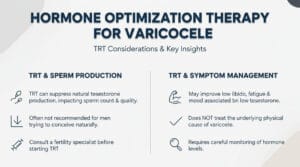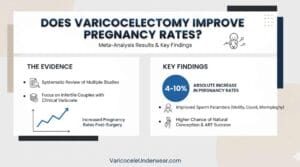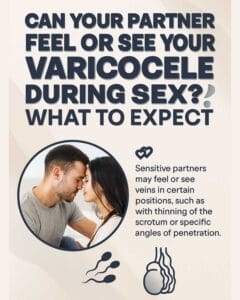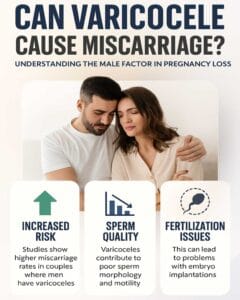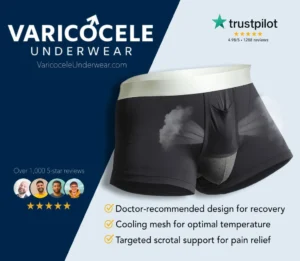Varicocele is one of the most common yet under-discussed men’s health conditions. It affects around 15% of all men and up to 40% of those struggling with infertility. Beyond fertility, an important question many men ask is: does varicocele affect testosterone levels? In this comprehensive guide, we will explore the connection between varicocele and testosterone, review the latest medical evidence, and outline practical treatment options—including non-surgical strategies and therapeutic approaches.
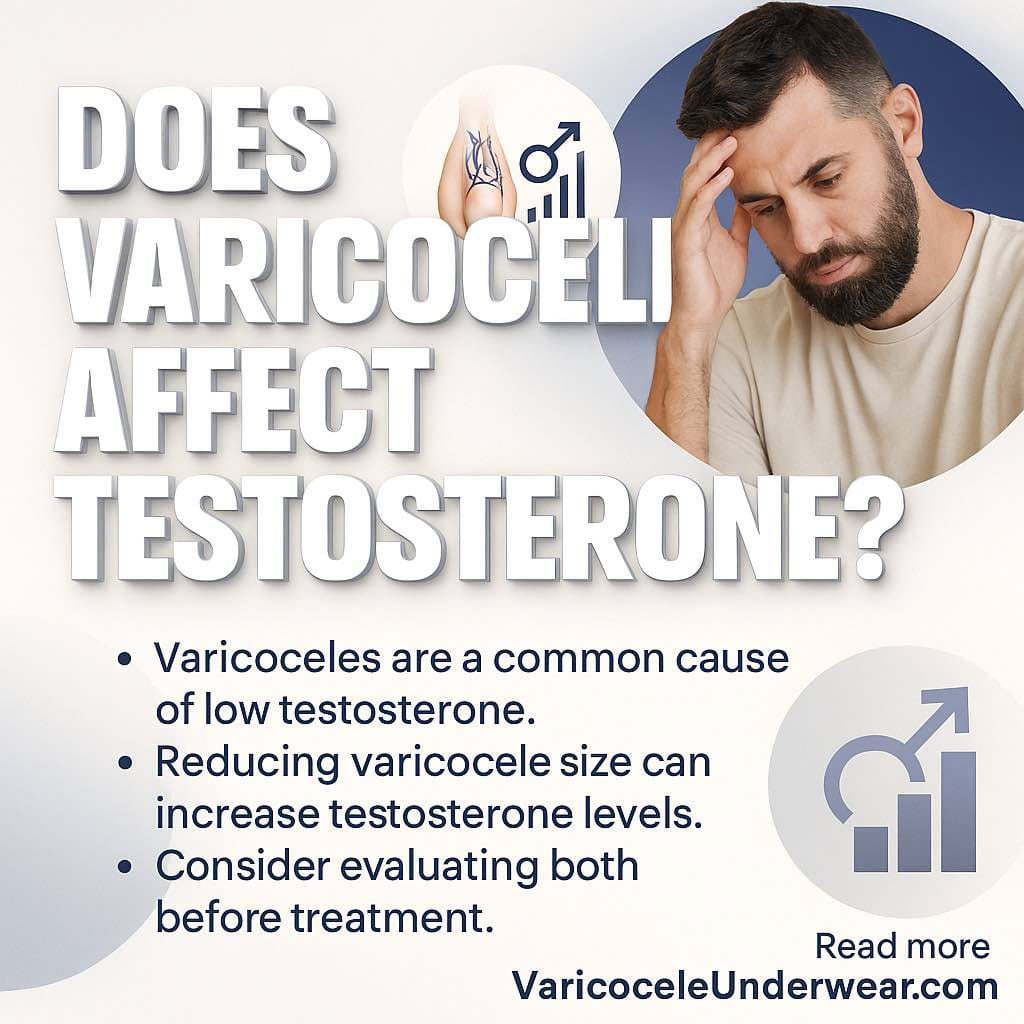

What Is Varicocele
A varicocele is an abnormal enlargement of veins within the scrotum, similar to varicose veins in the legs. These veins, known as the pampiniform plexus, are responsible for cooling arterial blood before it reaches the testicles. When they become dilated, blood flow is impaired, leading to increased scrotal temperature and potential damage to testicular function.
Key Facts:
- Prevalence: 15% of all men, higher in infertile men
- Typical Onset: Puberty and early adulthood
- Symptoms: Scrotal heaviness, dull pain, visible enlarged veins, reduced fertility
Causes and Risk Factors
The exact cause of varicocele remains unclear, but contributing factors include:
- Valve Dysfunction: Faulty valves in scrotal veins lead to pooling of blood.
- Anatomical Factors: The left testicular vein drains at a 90-degree angle, making varicoceles more common on the left side.
- Increased Abdominal Pressure: Heavy lifting, obesity, or chronic coughing may worsen symptoms.
- Genetic Predisposition: Family history of venous insufficiency.
Risk Groups: Young men, athletes performing heavy lifting, and men with a family history of vascular problems.
Symptoms and Potential Complications
While some men remain asymptomatic, others experience:
- Scrotal pain or heaviness, worse at the end of the day
- Visible or palpable enlarged veins in the scrotum
- Reduced sperm quality (count, motility, morphology)
- Potential hormonal changes, including lower testosterone
Untreated varicocele may contribute to male infertility, testicular shrinkage, and long-term hormonal imbalance.
The Connection Between Varicocele and Testosterone
Testosterone is the key male hormone produced primarily by the Leydig cells in the testicles. Disruption of normal testicular function caused by varicocele may interfere with testosterone production.
Mechanisms Linking Varicocele to Low Testosterone
- Increased Scrotal Temperature → Impaired Leydig cell function
- Oxidative Stress → DNA and cellular damage
- Reduced Blood Flow → Hypoxia and nutrient deprivation
Clinical Evidence
- A 2021 PubMed varicocele studies meta-analysis reported that men with untreated varicocele often show significantly lower serum testosterone compared to healthy controls.
- Studies from Mayo Clinic varicocele research and NHS varicocele guidance confirm that varicocelectomy (surgical repair) can improve testosterone levels in up to 70% of patients.
- Research also suggests that the severity of varicocele correlates with the degree of testosterone suppression.
Varicocele can lower testosterone by disrupting testicular blood flow and increasing oxidative stress. Clinical studies show men with untreated varicocele often have reduced serum testosterone, while surgical repair may improve levels in most cases.
Medical Treatment Options
When symptoms or fertility issues are significant, medical intervention is considered.
Varicocelectomy (Surgery)
- Microsurgical or laparoscopic procedure
- High success rate in improving testosterone and sperm quality
- Risks: recurrence, hydrocele, infection
Embolization (Minimally Invasive)
- Catheter-based vein blockage
- Less downtime but slightly higher recurrence
Read more about Varicocele treatment options – WebMD.
Non-Surgical & Lifestyle Approaches
For men seeking to reduce symptoms or support hormone balance without surgery, several strategies are effective.
Supportive Underwear
Specialized varicocele underwear can improve comfort by providing gentle compression, reducing scrotal pooling, and supporting testicular blood flow. Many men report symptom relief when wearing supportive garments.
Diet and Supplements
- Antioxidants (Vitamin C, E, CoQ10): Reduce oxidative stress
- Zinc: Supports testosterone production
- Omega-3 fatty acids: Promote vascular health
- Hydration: Maintains circulation
Exercise and Lifestyle
- Light to moderate exercise (walking, yoga)
- Avoid heavy lifting and prolonged standing
- Maintain healthy body weight
Cold Therapy
Applying cold packs intermittently may help reduce swelling and pain.
Men with varicocele can support testosterone naturally through lifestyle changes, antioxidant-rich diets, and supportive underwear. While these methods may not cure varicocele, they can significantly reduce discomfort and help maintain hormonal balance.
Case Study: John, 32 Years Old
John, a 32-year-old software engineer, reported persistent scrotal heaviness and low energy. Lab tests revealed borderline-low testosterone. Instead of immediate surgery, John tried a three-month regimen of lifestyle changes, including wearing varicocele underwear, supplementing with antioxidants, and adopting yoga. Follow-up showed improved energy levels, reduced pain, and stable testosterone. He plans to monitor symptoms with his urologist.
Expert Q&A and Myth-Busting
Does every varicocele lower testosterone?
Not always. Mild cases may not significantly affect hormone levels, but moderate to severe varicocele often shows an impact.
Is surgery the only way to restore testosterone?
Surgery offers the most reliable improvement, but lifestyle and supportive measures can help reduce symptoms and maintain hormonal health.
Can varicocele cause permanent low testosterone?
Long-standing untreated varicocele may cause irreversible Leydig cell damage. Early management is recommended.
Will supportive underwear cure varicocele?
Long-standing untreated varicocele may cause irreversible Leydig cell damage. Early management is recommended.
Does varicocele always affect testosterone levels?
Not always. While many men with varicocele show reduced testosterone, mild cases may not have a noticeable effect. Severity plays a major role.
Can non-surgical treatments increase testosterone?
Lifestyle changes and supportive underwear may improve symptoms, but surgery is most effective for restoring testosterone.
Should I see a doctor if I suspect varicocele?
Yes. A urologist can perform a physical exam and recommend treatment options tailored to your situation.
Conclusion
Varicocele is not just a fertility issue—it can also impact testosterone levels and overall men’s health. While surgery remains the gold standard for restoring hormone levels, non-surgical measures such as lifestyle adjustments, dietary support, and therapeutic underwear provide meaningful relief. Early diagnosis and proactive management can help men maintain healthy testosterone and improve quality of life.

